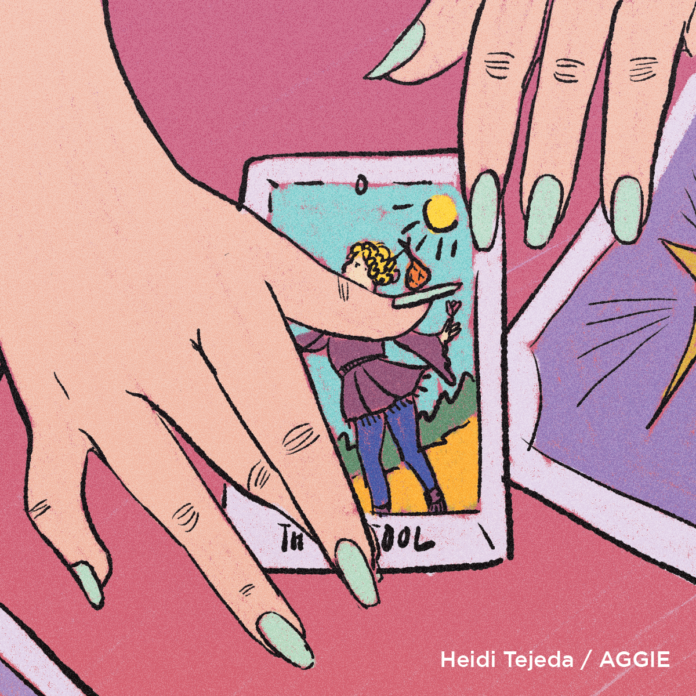Students share stories and opinions about zodiac signs, tarot readings and manifesting
By SABRINA FIGUEROA — features@theaggie.org
“Your actions may be touched by a fanciful frame of mind today,” the stars said. Well, at least the horoscope.com website says they did.
Astrology, tarot card readings and “manifesting” have all been re-popularized among younger generations over the years as a form of spirituality, especially on social media platforms. Maybe you have even come across predictions about your life based on zodiac signs or virtual tarot card readings that feed into your delusions about your crush.
No matter how popular it may be, there are still about 51% of Americans who don’t believe in astrology at all, according to a 2022 survey by YouGov.
Nonetheless, astrology is still quite popular among the younger generation — whether it’s being routinely practiced or there’s just general interest — and a college campus like UC Davis provides a great opportunity to see what young people actually think about it.
“I believe in [astrology] to a certain extent,” Paulina Rodriguez, a fourth-year managerial economics major, said. “I’m a Pisces, and some characteristics that people say apply to [the Pisces zodiac] I feel do apply to me personally, but others definitely don’t. This is even true among other people in my life too.”
However, Rodriguez explained that the notion of compatibility between zodiac signs when it comes to romantic relationships and friendships is not something she believes in.
“I’ve never really paid attention to when people have said there are certain signs that are compatible in friendships or relationships because I’ve had friends that are Leos and apparently, those signs don’t work together,” Rodriguez said. “Libras are also supposed to be [romantically] compatible with my sign, but every Libra I’ve dated has not worked out at all.”
Other students are more skeptical and think that astrology is far too simple to explain everything about the world, people and interpersonal relationships.
According to Ebony Macias, a third-year biological sciences major, horoscopes can be entertaining but not necessarily accurate.
“I don’t really believe in it, but I still think it’s fun. But, I do think that people are way more complicated and complex than zodiac signs make them out to be,” Macias said.
Ava Moore, a first-year political science major, agreed with this sentiment, saying that although there are multiple signs that are a part of one person’s “zodiac birth chart,” the zodiac characteristics and predictions are too stereotypical and broad for them to really be true and personal.
These concerns are actually discussed as problems in the study of astrology, stemming from modern astrology practices that became popular starting in the late 19th century, according to an article by Quartz Magazine. The concept of “sun-sign astrology” — where your sun sign indicates your character and personality — was created at a time when the universe was being discovered to be much larger than just the Earth and the Sun. It gave people reassurance that they were still important and written in the stars, even if they were small.
Branching off of astrology are the sectors of tarot card reading and even “manifestation,” which is the act of thinking or writing down aspirations with the intention of making them real simply through the power of thought. These disciplines have both contributed to the popularity of looking to the stars to explain behavior and events.
“Sometimes I’m scrolling on TikTok and a video will pop up with like two likes saying that someone is eyeing me, or that an ex is wanting to come back,” Moore said. “It’s very funny to me cause I’m like, ‘What if it’s true?’ but then it’s not and I get embarrassed for believing it.”
Rodriguez chimed in with an experience similar to this.
“I had a coincidence — just once — where a video was like, ‘Someone is going to come back to your life,’ and someone who I had previously talked to requested to follow me again,” Rodriguez said. “But, even if those videos do explain or predict something in your life, I feel like [they] are based for a large audience anyways, so they’re broad and not really specific.”
Macias explained how she tried to “manifest” something once and it worked, but she also “had to put some work into it.”
“I couldn’t really just write, ‘I will get an A on this next exam,’ without studying or else I probably would’ve failed. You also can’t say, ‘I will get this job,’ and then not try in the application and interview process,” Macias said. “It definitely is also up to you, and not just the law of attraction or the universe.”
Although astrology and similar disciplines are practiced in their entirety and have become trendy to take part in, a lot of people are still reluctant to join in on the fun.
Perhaps the most relevant and constant criticism of astrology is that most of it is not based in science. Even famous psychiatrist and psychoanalyst Carl Gustav Jung said there was no causal relationship between the stars and what happens down on Earth — although he did occasionally use astrology as a tool in his analytic practices.
Macias, however, said that people can still believe in astrology even if it’s not scientific.
“I wouldn’t tell people not to follow or believe in astrology just because it doesn’t have research to prove it. At the end of the day, following a movement, whether it’s astrology or even religion, is about building community,” Macias said. “Plus, even science changes and differs from time to time, so you never know. Just have fun with it.”
Written by: Sabrina Figueroa — features@theaggie.org




